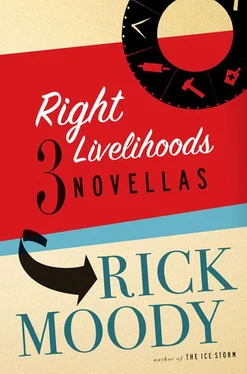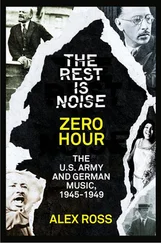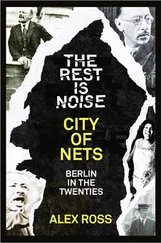He was killing roaches in his empty apartment when suddenly he knew. He was prying up a floorboard to look for roaches and he knew. As certainly as he knew the grid of his city. He’d walked by Addict Number One one day, when he was sixteen, in Tompkins Square. Far from his own neighborhood. On his way to a game of handball. He’d walked by him, he knew it. Not someone else, but him, Addict Number One. Guy looked like a faggot, the way Cortez told Cassandra later. All white guys looked like faggots as far as he was concerned, and he’d just as soon kill the punk-ass motherfucker for looking like a faggot as for any other reason, although there were plenty of other reasons. Main thing was that if he could figure out a way to kill Addict Number One in his memory, then a whole sequence of events would fail, like when Addict Number One hooked up with certain black guys in his neighborhood who had been fronting heroin up until that time and gave to them the correct chemical compound of Albertine, the secrets of the raw materials needed for the manufacture, the apparatus. If Cortez killed his ass, this future would not turn out to be the real future. If Cortez killed his ass, then Cortez would control the syndicate.
It would take even more time and money, more time doping, a solid six months, in fact, in his room, going through that whole sequence of his life, like that time with his neighbor, he told Cassandra. Over and over again, Eduardo had to deal with that drunken fuck neighbor, not even gonna say his name, Cortez would say to Cassandra, fighting off that memory when the guy, Eduardo’s alleged uncle, in the rubble of an abandoned building, exposed himself to little Eduardo, his droopy uncut penis, fucking guy couldn’t get hard no more, looked like a gizzard, and the uncle drunkenly pronounced that he was lonelier than any man had ever been, didn’t belong in this country, couldn’t go back to the island nation of his birth, no reason for a man to be as lonely as this man, no reason for this surfeit of loneliness, every day in every way, and would Eduardo make him feel comfortable for just this one day, treat him like a loving man this one time, because he was so lonely, had an aching in his heart that nothing could still, wouldn’t ask again, he swore, and took Eduardo, just a little compadre, just a wisp, couldn’t even lift an aluminum baseball bat, couldn’t lift a finger against the alleged uncle, took Eduardo for his goddess— you are my priestess, you are my goddess —and now Eduardo vowed that he would never suffer before any man the way he had with the uncle.
The syringe, the eyedropper, the concentric rings of the past. Again and again the uncle would attempt to seduce him. He was willing to go through that, a thousand times if he had to, until he had the gun on his person, in the waistband of his warm-up suit, and he was ready. He was sixteen, with fresh tattoos, and he’d been to mass that morning and he had a gun, and he was going to play handball, and he saw this white faggot in the dog run, and he just walked up to him like they never met. Though in truth it was like Eduardo Cortez knew him inside and out, and Eduardo wanted to make something out of himself, his life that was so lost up until then, where he was just a bike messenger, and the desperadoes of his neighborhood were all going to be working for him, and if they made one wrong move, he’d throw them off a fucking bridge, whatever bridges is still up, and if they touched the little girls in his neighborhood, that was another crime, for which he would exact a very high price, a mortal price, and the first priority, the long-term business plan was that Eduardo Cortez would be the guy that would make profits from memories, even if his own memories were bad. That was just how it was going to go, and I saw all this with Cassandra, that Cortez had managed by sheer brute force to murder a memory, splatter a memory like it was nothing at all.
One minute Addict Number One was wandering in the East Village, years before he was an addict, years before there even was an Albertine to cop, and he was thinking about how he was going to get funding for his digital-video project, and then, right in front of a bunch of dog walkers, the guy disappeared. This is the story, from the point of view of those who were not in on the cascading of memories. It’s one of the really great examples of public delusion when you read it in the online police records, like I did.
Witnesses insist that the victim, first referred to as Caucasian John Doe, later identified as Irving Paley of 433 East 9th St, was present on the scene, along with a Hispanic man in his teens, and then, abruptly, no longer present. “It’s as if he just vanished,” remarked one witness. Others concur. No body located thereafter. Apartment also completely emptied, possibly by assailant.
Good thing those records were stored on a server in Queens. Since One Police Plaza is dust.
The guys in the smelting plant were all wearing uniforms. They were the uniforms of bike messengers, as if the entire story somehow turned on bike messengers. Bike messenger as conveyor of meaning. There were these courtiers in the empire of Eduardo Cortez, and the lowest echelon was the beat cop, a phalanx of whom encircled the building, sending news of anyone in the neighborhood into command central by radio. And then there were the centurions of the empire, the guys in the bike messenger uniforms, wearing the crash helmets of bike messengers. All done up in Lycra, like this was some kind of superhero garb. When the elevator door swung back, it was clear that we had definitely penetrated to the inner sanctum of Eduardo Cortez, as if by merely thinking. And this inner sanctum was inexplicable, comic, and deadly. Sure, it was possible that I had now been researching for two weeks and no longer needed food or sleep in order to do it. Sure, maybe I was just doing a really great job, and, since I was an honest guy who seemed cool and nonthreatening, maybe I was allowed into places that the stereotypical Albertine abuser would not ordinarily be allowed. But it seemed unlikely. This was evidently one of the fabled five mansions of Cortez, among which he shuttled, depending on his whim, like a despot from the coca-producing latitudes.
“Eddie,” Cassandra sang out into the low lighting of the smelting-plant floor, “I brought him like you said.”
Which one was Eddie? The room was outfitted with gigantic machines, suspension devices, ramrods, pistons thundering, wheels turning, like some fabulous Rube Goldberg future, and there was no center to it, no throne, no black leather sofa with a leopard print quilt thrown over it, and none of the bike messengers in the room looked like the Cortez of my memory, the Cortez of Tompkins Square Park, on his way to play handball. Perhaps he’d had himself altered by a cosmetic surgeon with a drug problem and a large debt. In fact, in scanning the faces of the dozens of bike messengers in the room, it seemed that they all looked similar, all of European extraction, all harried, with brown hair on the verge of going gray, all with blue eyes, a little bit paunchy. Were they robots? Were they street toughs from the bad neighborhoods? They were, it turned out, the surgically altered army of Eddie Cortez foot soldiers, who made it possible for him to be in so many places at so many times, in all the fabled five mansions. Eddie was a condition of the economy now, not a particular person.
At the remark from Cassandra, several of the bike messengers gathered in the center of the room. Maybe they were all modified comfort robots, so that Eddie could use them professionally during the day and fuck them later at night. One of them finally asked, with a blank expression, “His writing any good?”
Читать дальше












